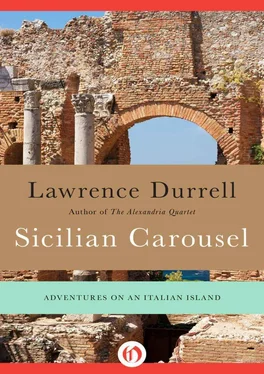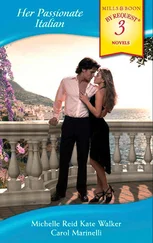Lawrence Durrell - Sicilian Carousel - Adventures on an Italian Island
Здесь есть возможность читать онлайн «Lawrence Durrell - Sicilian Carousel - Adventures on an Italian Island» весь текст электронной книги совершенно бесплатно (целиком полную версию без сокращений). В некоторых случаях можно слушать аудио, скачать через торрент в формате fb2 и присутствует краткое содержание. Год выпуска: 2012, Издательство: Open Road Media, Жанр: Путешествия и география, на английском языке. Описание произведения, (предисловие) а так же отзывы посетителей доступны на портале библиотеки ЛибКат.
- Название:Sicilian Carousel: Adventures on an Italian Island
- Автор:
- Издательство:Open Road Media
- Жанр:
- Год:2012
- ISBN:нет данных
- Рейтинг книги:4 / 5. Голосов: 1
-
Избранное:Добавить в избранное
- Отзывы:
-
Ваша оценка:
- 80
- 1
- 2
- 3
- 4
- 5
Sicilian Carousel: Adventures on an Italian Island: краткое содержание, описание и аннотация
Предлагаем к чтению аннотацию, описание, краткое содержание или предисловие (зависит от того, что написал сам автор книги «Sicilian Carousel: Adventures on an Italian Island»). Если вы не нашли необходимую информацию о книге — напишите в комментариях, мы постараемся отыскать её.
Sicilian Carousel: Adventures on an Italian Island — читать онлайн бесплатно полную книгу (весь текст) целиком
Ниже представлен текст книги, разбитый по страницам. Система сохранения места последней прочитанной страницы, позволяет с удобством читать онлайн бесплатно книгу «Sicilian Carousel: Adventures on an Italian Island», без необходимости каждый раз заново искать на чём Вы остановились. Поставьте закладку, и сможете в любой момент перейти на страницу, на которой закончили чтение.
Интервал:
Закладка:
We were about to turn away from this slowly overwhelming darkness and back into the raucous streets when Roberto, who still peered keenly down the valley, implored a moment’s patience of us, for what reason I could not tell. He seemed as keyed up as if we were to expect something like a firework display. But it was better than that; presently there came the swift wing beats of a church bell which sounded like a signal and soundlessly the temples sprang to floodlit life all together, as if by a miracle. This was aerial geography with a vengeance, for they were to be our after-dinner treat tonight! But there were signs of raggedness and fatigue in the party and I could see that some of us might prefer to stay in the hotel and sleep. The Count’s wife looked really ill with weariness and I wondered why they had embarked her on such a journey. Mrs. Microscope too looked crusty though we had had no more news of her spleen. But there was to be a bit of delay as yet for our schedule called for half an hour’s shopping halt in the town, to enable us to buy curios and generally take a look round. Not all set off for this treat; many stayed in the bus. While, rather cowardly, I took myself off with Deeds to a bistro where I anticipated dinner and the fatigues of temple haunting by a couple of touches of grappa which was like drinking fumed oak in liquid form. Heartening stuff. Deeds fell into conversation with a eunuchoid youth who brought us coffee with a kindly but disenchanted air.
In the far corner, however, there was a small group of middle-aged to elderly men who attracted my instant attention by their hunched-up look and their black clothes and battered boots. They were gnarled and leathered by their avocation — could they have been coal miners, I wondered? Dressed awkwardly in their Sunday best with heavy dark suits and improbable felt hats which looked as if very seldom worn. Or perhaps they were mourners attending the funeral of some local dignitary? They spoke in low gruff tones and in a dialect Italian. The sister of the eunuch served them exclusively and with such obvious nervousness that I finally concluded that they must be a group of Mafia leaders on a Sunday outing. Their little circle exuded a kind of horrid Protestant gloom, and most of their faces were baneful, ugly. They were drinking Strega as far as I could make out, but the massive sugar content was not making them any sweeter. It was a strange little group and all the other customers of the place beside ourselves shot curious glances at them, wondering I suppose like ourselves, what and from where.… The mystery was only cleared up when Roberto appeared in search of a quick coffee and caught sight of us. He seemed not unprepared for the question, and it was clear from his way of looking at them when Deeds pointed them out that they did seem singular, almost like another race. But no, that was not the case. They were simply sulphur miners on a night out in town.

THE TEMPLES OF JUNO LUCINA AND CONCORD AT AGRIGENTO
“They are Zolfataioi,” said Roberto with a smile. “We have been shielding you from the uglier side of Sicily, but we have our own black country here like you have; only it’s not black, it’s yellow. The sulphur workers live a sort of grim separate life except for their occasional excursions like this — though it’s usually to Caltanissetta that they go. It’s the headquarters of the trade.” The men looked as if they were waiting anxiously for transport and those at the two tables playing cards were doing so abstractedly, as if marking time. They were as impressively different from the other Italians as would have been, say, a little group of Bushmen, or Japanese. But they drank with precision. One of the elder ones with a leather face and expressionless eyes had the knack of tilting and emptying his glass in a single gesture, without swallowing. He looked like Father Time himself, drinking a whole hourglass of time at each quaff. I watched them curiously.
At that moment there came a diversion in the form of a large grey sports car which drew up outside the cafe. From it descended a couple of extremely well dressed and sophisticated youths of a vaguely Roman allure — I put them down as big-city pederasts having a holiday here. But their manner was offensively superior and they acted as if they owned the place. They were fashionably clad in smart colored summer wear and open collars, while their hair was handsomely styled and curled. They wanted to leave a message for some local boy and they engaged the flustered eunuch in conversation. Meanwhile, and the touch had a somewhat special insolence, they had left the car’s engine running so that the exhaust was belching noisome fumes on to the terrace and into the cafe itself. One felt resentful; it was as if they were deliberately flaunting not only their classical proclivities but their superiority as well. Their tones were shrill and their Italian of the cultivated sort.
Their arrival produced a little ripple of interest in the circle of sulphur miners, though the general tone was apathetic and not resentful. They eyed these two butterflies in their expressionless way and then looked at one another with a kindly irony. It was not malicious at all. Then the old man set down his tiny Strega glass and, wiping his moustache, said in a firm audible tone, “Ah! pederastici!” It was not offensive, simply an observation which classified the two, who must have overheard for they shrugged their shoulders and turned back to the eunuch with more questions about their friend Giovanni. Moreover, the word fell upon the silence with a fine classical limpidity — five lapidary syllables. It was perfectly summed up and forgotten — the whole incident. The one eloquent word was enough. No further comment was needed, and the miners turned back to their inner preoccupations and sank ever deeper into their corporate reserve while the two turkeys gobbled on.
A Greek root with
A Latin suffix
A Grecian vice
A Latin name
But at last it was time to take ourselves off to the gaunt restaurant where a single long dinner table had been prepared for us. There were to be some casualties among us, and about six of the wearier, as predicted, decided on an early night. We were anyway to have another look at the Temples by daylight on the morrow so that they were not to lose very much. It was only annoying for Mario, for the hotel was in the valley, some way off, and he would have to ferry them and then come back and ferry us to the Temples, going without dinner in the process. But he took it all with grave good humor and that undemonstrative courtesy that I was beginning to recognize as a thoroughly Sicilian trait. The weary therefore moved off, content to eat a sandwich in bed, while we doubled up our ranks and did our best to look joyfully surprised by yet another choice between spaghetti and rice. But the wine was good in its modest way. And we did full justice to it telling ourselves that we owed it to our fatigue, though Roberto warned us that we were only going to have a sniff at the Temples and not attempt to “do” them thoroughly until tomorrow. It was to see them floodlit, that was all. But how grateful one finally was for the glimpse, however brief, and how sorry one felt for the absentees.
We had hardly finished dinner when impassive Mario appeared with the bus and we were on the way down the hill, curving away upon the so-called passe-giata archeologica , a beautiful modern road which winds in and out of the temple circles; one by one these great landmarks came out of the night to meet us, while a thousand night insects danced in the hot light of the floods. The bare ground — yes, it smelled of Attica again. The whiffs of thyme and sage, and the very soil with its light marls and fawn-colored tones made the island itself seem like some huge abstract terracotta which by some freak of time might give birth to vases, amphorae, plates, craters. An ancient Athenian must have walked here with the sympathetic feeling of being back in Athens. And it was extraordinary to realize that this huge expanse of temples represented only a tiny fraction of what exists here in reality, and which remains to be unearthed. The archaeologists have only scratched the surface of Agrigento; stretching away on every side, hidden in the soft deciduous chalk through which the twin rivers have carved their beds, there lie hidden necropolises, aqueducts, houses and temples and statues as yet quite unknown to us; and all the wealth inside them of ceramics and jewelry and weapons. It seems so complete as it is, this long sparkling ridge with its tremendous exhibits. Yet Agrigento has hardly begun to yield up all its treasures, and in coming generations what is unearthed might well modify all our present ideas about it. Long shadows crisscrossed the night. Leaving the glare of the floods one was at once plunged into dense patches of fragrant darkness. There was another busload of dark figures round the Temple of Concord, all down on their knees. Were they praying? It seemed so.
Читать дальшеИнтервал:
Закладка:
Похожие книги на «Sicilian Carousel: Adventures on an Italian Island»
Представляем Вашему вниманию похожие книги на «Sicilian Carousel: Adventures on an Italian Island» списком для выбора. Мы отобрали схожую по названию и смыслу литературу в надежде предоставить читателям больше вариантов отыскать новые, интересные, ещё непрочитанные произведения.
Обсуждение, отзывы о книге «Sicilian Carousel: Adventures on an Italian Island» и просто собственные мнения читателей. Оставьте ваши комментарии, напишите, что Вы думаете о произведении, его смысле или главных героях. Укажите что конкретно понравилось, а что нет, и почему Вы так считаете.











